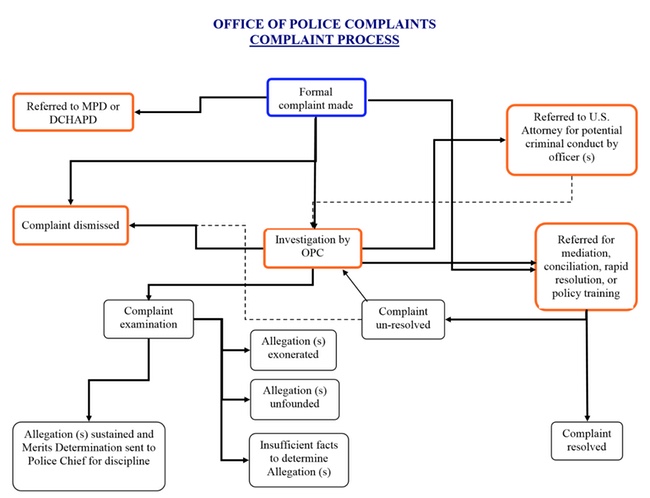When a complaint is sent for investigation, it is assigned to one of OPC’s staff investigators. The investigator interviews the complainant, subject officer, and any witnesses the complainant identifies, in addition to attempting to locate and interview any other police or non-police witnesses who may be able to provide relevant information. The investigator also collects and reviews other evidence, including MPD documents, hospital records, materials from other sources, the scene of the incident, and any other relevant information. When the investigation is complete, the investigator drafts an investigative report, which, along with all the evidence gathered in the investigation, is reviewed by a supervisor. The executive director then reviews the report of the findings of the investigation, and determines if the complaint should be dismissed, which requires the concurrence of one PCB member, or referred to a complaint examiner for review and a decision on the merits of the complaint.

In addition, OPC’s three principal methods of resolving complaints – dismissal, mediation, and complaint examination – are discussed in more detail below:
Following information is needed if possible:
- The day, time, and exact location of the incident
- The officer’s name, badge number, and physical description
- Witnesses’ names, addresses, and telephone numbers
- Vehicle or license numbers for any vehicles involved in the incident
- Any other evidence available, including copies of traffic tickets, police reports, photographs, and medical records (If you have injuries, describe their nature and extent.)
If you are injured as a result of alleged police officer misconduct, seek immediate medical attention and try to have your injuries photographed. Preserving evidence of your injuries is an important part of your complaint.
After the Complaint is Made
Once a complaint is made, you will be contacted by Office of Police Complaints and informed about the next step. Office of Police Complaints may decide to investigate your complaint, attempt to conciliate your complaint against the officer, or refer the complaint to an outside mediator for resolution. If conciliation or mediation attempts are not successful, Office of Police Complaints may refer your complaint for investigation. After completing the investigative report, Office of Police Complaints may refer the matter to a complaint examiner who can conduct a hearing, if necessary.
If the complaint examiner sustains one or more of the allegations in your complaint, the matter is then referred to the Chief of Police for appropriate action. The officer charged with misconduct may then be subject to discipline if the Chief of Police agrees with the complaint examiner's decision. Depending on the severity of the case, an officer can be subject to discipline ranging from an oral reprimand to termination. The Chief of Police may decide on other punishments as well. If the Chief disagrees with the findings of the complaint examiner, the case is reviewed by a panel of three complaint examiners. If the panel upholds the decision of the original complaint examiner, the police chief must then impose the appropriate discipline on the accused officer. Although the Office of Police Complaints has the authority to dismiss a complaint at any stage, we are committed to a fair and thorough review of each complaint.


